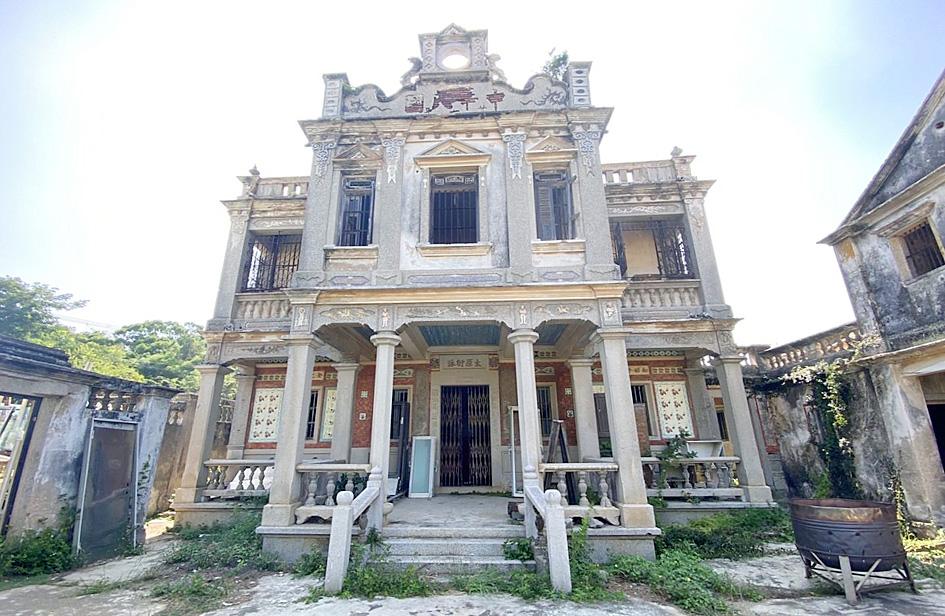Kinmen County on Wednesday began the restoration of a 92-year-old house and county-level cultural heritage site that county officials said would be turned into a hostel to boost the economy of Jinsha Township (金沙).
Kinmen County Commissioner Yang Cheng-wu (楊鎮浯) and the descendants of the family residence’s original owners attended the ceremony to mark the start of the restoration.
The Wang Chin-cheng’s Western House (王金城洋樓) combines Western and Hoklo architectural elements in an elaborate and graceful way, the county government said in a news release.

Photo: Wu Cheng-ting, Taipei Times
The county expects to complete the NT$40.2 million (US$1.44 million) restoration by the end of next year, it said.
Wang Chin-chen (王金城), a wealthy Kinmen native who lived in Indonesia, paid for the construction of the house, which began in 1918 or 1919, it said.
His brother, Wang Chin-so (王金鎖) supervised the construction and took up residence there upon its completion in 1932, it said, adding that Wang Chin-chen never lived in the house.
Later, Wang Chin-chen’s son, Wang Yun-chuan (王永傳), and his Indonesian wife briefly lived in the house, it said.
In 1937, the Imperial Japanese Army seized the house, which was not returned to Wang Chin-so until 1946, it said.
In 1954, the house was taken over by then-Republic of China Army 200th Division commander Han Cho-huan (韓卓環).
The news release cited Wang Chin-so’s granddaughter, Wang Yueh-mei (王月美), as saying that the takeover happened in the year she was born and that the family moved to three nearby houses that had also been built by her great uncle.
Wang Yueh-mei often visited the family’s erstwhile home with her father and still remembers that there was a bell on the house’s tower and that its gatehouse bore bullet marks from its two periods of military occupation, it said.
Han was twice commended for his garrison on Kinmen, and the house on both occasions hosted then-president Chiang Kai-shek (蔣中正) as a guest, she was cited as saying.
From 1956 to 1965, the house was used as a depot for engineering material, it said.
After that, a neighbor of the Indonesia-based members of the Wang family wired NT$30,000 to repair the house’s roof and outside walls, it said.
The house was recognized as a cultural heritage in 2015 for its rich history and the inherent artistic value of its architecture, the county government said.
The exterior features elaborate relief sculptures of soldiers, servants, angels and floral scrollwork, while the front of the house is adorned by earthenware totems in the Guangdong style, it said.
The walls of rooms on the ground floor feature alternating brick patterns that show exquisite artisanship, it said.
As banditry was rife in early 20th century Kinmen, numerous security features were incorporated into the architecture, including anti-burglary windows and fortified outer doors and doors to the staircase, it said.
Military slogans and the national flag were prominently displayed while the house was used by the army, it added.
The house is the only Western-style mansion in Kinmen with a classical Chinese landscape garden that has an artificial mountain and a pond, it said.

Alain Robert, known as the "French Spider-Man," praised Alex Honnold as exceptionally well-prepared after the US climber completed a free solo ascent of Taipei 101 yesterday. Robert said Honnold's ascent of the 508m-tall skyscraper in just more than one-and-a-half hours without using safety ropes or equipment was a remarkable achievement. "This is my life," he said in an interview conducted in French, adding that he liked the feeling of being "on the edge of danger." The 63-year-old Frenchman climbed Taipei 101 using ropes in December 2004, taking about four hours to reach the top. On a one-to-10 scale of difficulty, Robert said Taipei 101

Nipah virus infection is to be officially listed as a category 5 notifiable infectious disease in Taiwan in March, while clinical treatment guidelines are being formulated, the Centers for Disease Control (CDC) said yesterday. With Nipah infections being reported in other countries and considering its relatively high fatality rate, the centers on Jan. 16 announced that it would be listed as a notifiable infectious disease to bolster the nation’s systematic early warning system and increase public awareness, the CDC said. Bangladesh reported four fatal cases last year in separate districts, with three linked to raw date palm sap consumption, CDC Epidemic Intelligence

Two Taiwanese prosecutors were questioned by Chinese security personnel at their hotel during a trip to China’s Henan Province this month, the Mainland Affairs Council (MAC) said yesterday. The officers had personal information on the prosecutors, including “when they were assigned to their posts, their work locations and job titles,” MAC Deputy Minister and spokesman Liang Wen-chieh (梁文傑) said. On top of asking about their agencies and positions, the officers also questioned the prosecutors about the Cross-Strait Joint Crime-Fighting and Judicial Mutual Assistance Agreement, a pact that serves as the framework for Taiwan-China cooperation on combating crime and providing judicial assistance, Liang

US climber Alex Honnold left Taiwan this morning a day after completing a free-solo ascent of Taipei 101, a feat that drew cheers from onlookers and gained widespread international attention. Honnold yesterday scaled the 101-story skyscraper without a rope or safety harness. The climb — the highest urban free-solo ascent ever attempted — took just more than 90 minutes and was streamed live on Netflix. It was covered by major international news outlets including CNN, the New York Times, the Guardian and the Wall Street Journal. As Honnold prepared to leave Taiwan today, he attracted a crowd when he and his wife, Sanni,